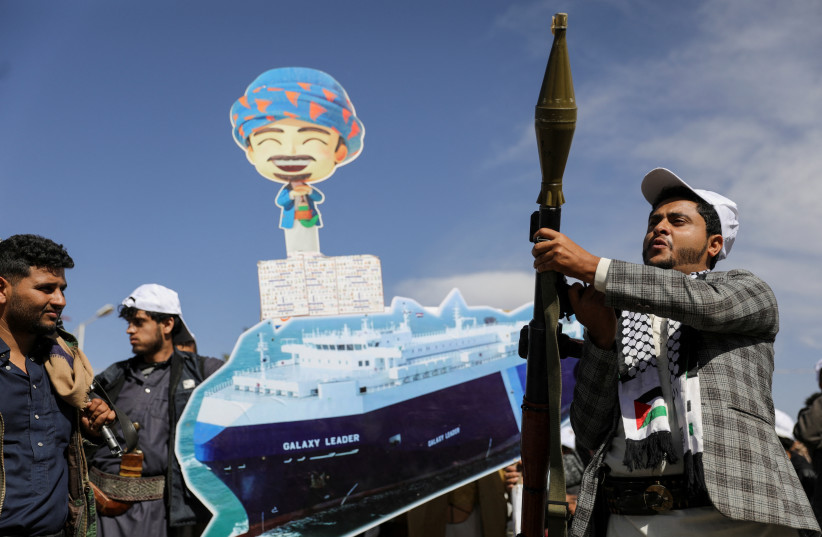Houthi leader Abdul-Malik al-Houthi announced on Thursday that the group had carried out 96 missile and drone attacks over the past five months, targeting 61 ships in the Red Sea and the Persian Gulf.
For more stories from The Media Line go to themedialine.org
The Houthis also confirmed that they had introduced submarine warfare into their operations, reflecting the development of their military capabilities and raising international concerns.
In context: After the war between Israel and Hamas broke out last October, the Houthis launched a series of missiles and drones toward Israeli cities. In November 2023, the Houthis began hijacking and targeting commercial ships that they claimed had connections to Israeli entities and individuals.
In mid-February, the Houthis attacked the Rubymar cargo ship in the Bab-el-Mandeb strait, sinking the ship and causing it to release the 41,000 tons of hazardous fertilizers it had been transporting.
The United States Central Command called the event an “environmental disaster.” Separately, a Houthi missile attack on the cargo ship True Confidence last week killed three sailors—the first civilian deaths since the Houthis began these attacks—injured others, and subsequently sank the cargo ship.

These continuing attacks are reshaping the dynamics of maritime security in the region.
The Media Line contacted Houthi leading figure Abdul Sattar Al-Nehmi via phone to understand the Houthis' intentions for the coming period.
Al-Nehmi told The Media Line that the Houthis’ operations will continue until the group “forces” global powers, including the United States and the United Kingdom, to implement their demands, which include stopping Israeli military operations in the Gaza Strip and increasing humanitarian aid to Gaza.
He said that the group has “more surprises” in store that will lead the US, Israel, and other Western powers to meet the Houthis’ demands.
Al-Nehmi said that the attacks on True Confidence and Rubymar were a result of the sailors’ insistence on defying the Houthis and heading toward Israeli ports. In fact, neither of the ships was on its way to Israel.
“We have a firm belief in our leadership and its decisions, which motivates us to continue these operations in support of our brothers in Gaza,” Al-Nehmi said.
Many observers say that the Houthis are exploiting pro-Palestinian sentiment among Yemenis to continue the attacks.
Former Saba News Agency journalist Samah Lutf—currently a freelance journalist based in Aden and Egypt—told The Media Line that the international community has no choice but to either “eradicate” the Houthis or try to bring them into an agreement that ensures maritime security in the region.
“Due to regional and local support, generous Iranian backing, and the absence of economic and political accountability towards the world, the Houthis are becoming bolder in their military operations, considering it the only way to improve their image and recreate the popular support they lost due to the economic and political crises they are facing in Yemen,” she said.
Lutf noted that Houthis’ operations have gradually escalated. “The Houthis initially only targeted ships to warn them before gradually starting their direct attack, which caused partial damage to a group of those cargo ships until the attacks reached the point of sinking ships and killing their crews,” she said.
The attacks will continue as long as the Houthis enjoy Iranian and popular support, Lutf said.
The US and Yemen have revealed complex networks connecting Iran to the Houthis, including training by Iran and the transfer of Iranian arms. While acknowledging good relations with Tehran, Houthi leaders deny such a connection.
An anonymous employee at Hudaydah seaport—which the Houthis control—told The Media Line that multiple banks and shipping companies in Yemen facilitate Iranian support of the Houthis through financial support and the transfer of equipment.
“There are numerous shipping companies and ships that work to bring in goods and tools for the Houthis from Iranian or Iran-affiliated companies,” he said, noting that he had observed more than 200 boats transferring weapons manufacturing material for use by the Houthis.
Although the Houthis claim that their attacks are meant to force Israel to stop its war with Gaza, many experts say that the group’s real aim is to use a show of force to become a more meaningful player in the region.
Associate Professor of Sociology at Sana’a University Ahlam Al-Qadi—currently in Egypt—told The Media Line that the Houthis use their military operations as leverage in their peace negotiations with Saudi Arabia. She also noted that the Houthis’ styling as a force supporting the Palestinian cause and opposing Israel and the US would lead to popular support for the movement.
The attacks have increased the group’s status, both regionally and within Yemen, and the Houthis are, therefore, likely to continue similar attacks, Al-Qadi said.
Some say that the increasing Houthi military operations are the result of Iran’s attempt to put pressure on the US and promote its strategic objectives. According to this line of thought, Houthi attacks will stop only once Iran calls for an end to the operations.
